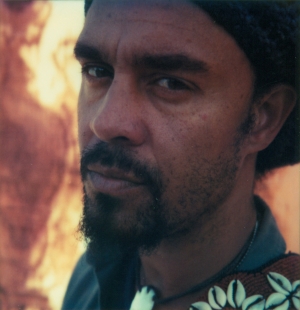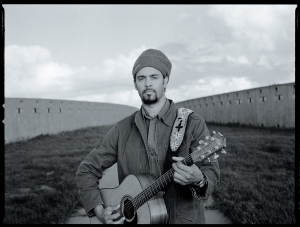|
Taken from College Crier (May 02, 2007)
Michael Franti: Barefoot Bodhisattva
by Jess Hopsicker
 A year ago I had the pleasure to stand there and watch the man walk past me. It all happened so slowly, on the deck of the lodge at the Mountain Jam, I remember how the seconds stretched into minutes. I stood there, open-mouthed as if I was about to speak but I was taken, it was from the way he carried himself, to the bottom of his feet. Amidst the misty driving rain upon the mud-slathered mountain, his bare feet were clean. For all I knew they never touched the ground. I craned my neck to watch the doors part before him, and once he left the spell was broken. Time returned. "Michael Franti," my festival friend muttered beside me, "damn I wanted him to sign something." It made me wonder if he was as entranced as I was. A year ago I had the pleasure to stand there and watch the man walk past me. It all happened so slowly, on the deck of the lodge at the Mountain Jam, I remember how the seconds stretched into minutes. I stood there, open-mouthed as if I was about to speak but I was taken, it was from the way he carried himself, to the bottom of his feet. Amidst the misty driving rain upon the mud-slathered mountain, his bare feet were clean. For all I knew they never touched the ground. I craned my neck to watch the doors part before him, and once he left the spell was broken. Time returned. "Michael Franti," my festival friend muttered beside me, "damn I wanted him to sign something." It made me wonder if he was as entranced as I was.
"Uh-huh" I answered, slowly coming back to my senses, my face flushed, " the man's a god."
I was crushed to have missed it earlier, and was later regaled with stories of how he leapt up onstage during Keller Williams's set along with 1000 beat-boxers. Corralled in the ticket room, I witnessed the exodus after the show, as the wide-eyed spectators lined up to leave; they mumbled his name with admiration.
My first encounter with him was purely superficial, but the moment stayed with me. A year later the chance arose to conduct an actual interview the "god" Franti, and little did I know how right I was about his divinity. Michael Franti is a minstrel, storyteller, songwriter and a human rights activist: a real barefoot bodhisattva. In a time of global turmoil, his message is simple, peace through music and human contact. "We can bomb the world to pieces, but we can't bomb it into peace." Reach out with a kind word instead of a WMD. In 2004 he walked his talk and took his show on the road. Armed with a guitar, he took a camera crew to the war-torn world of the Middle East. Instead of the few biased media feeds we Americans receive, he witnessed and embraced the human wreckage first hand. In the footage shot, a music video / documentary entitled I Know I'm Not Alone, his message is growing in popularity.
Another anniversary of "Mission Accomplished" passed us by. What good is one man's mission of peace going to accomplish when everyone else it seems is preparing for the end of the world? At least he took it a step further, more like thousands of miles outside the shallow worldview and six inches in front of our own workaday lives. Through music he spreads his message, we can listen, dance, sing along, and pass it on. He helped lay to rest my own childish preconceived notions about the never-ending war. Instead of the allotted 15 minutes, I could have spent hours on the phone with him, and still I wouldn't be able to do the man justice.
 JH: You have a real social responsibility as an artist; do you pay a high price for that? JH: You have a real social responsibility as an artist; do you pay a high price for that?
MF: I think all of us have a social responsibility no matter what walk of life we come from; I'm able to mix music with what I do so I always have fun doing it. I don't think about it as being a high price. I think of it as being a great opportunity in my life.
JH: Is it hard to stay underground with so much respect behind you?
MF: At times, but every time I come home. My kids and my family life humble me, digging in my garden and stuff at home.
JH: In 2004 you toured around the Middle East, with just a guitar, did you go in with any preconceived notions, or with an open mind?
MF: Well, I tried to go in with a open as mind as possible but I'm the kind of person that really questions our government's motives about entering Iraq. I didn't feel that they were justified. When I got there I saw the pain and suffering on both sides. The Iraqi families that lost everything, they lost their homes they lost family members, and they didn't have access to food, healthcare or an education. I met US soldiers that thought they were going over there for one reason, and then they found out that those reasons were lies. I guess the way that it really changed me, is that I've done a lot of work connecting with veterans and military families.
JH: Was the whole process cathartic and were you pleased with the final outcome?
MF: Well, making the film was a very cathartic ritual, we had over 200 hours of videotape, and we had to get it down to an 86-minute film. The whole process, as I watched over the footage, took me back to the places where I was, and sometimes while I was there I didn't have a chance to stop and feel and emote everything that was happening at the time, and when you get back home and you relive it. So what I did, I wrote songs, and they ended up being in the film, and they helped express my emotions about it.
JH: From you being there first hand what kind of media disinformation have you witnessed?
MF: Well, I guess the main thing is disinformation by omission. We have yet on the American television to see the effects that the bombing has on the lives of individuals, we don't see their homes, the buildings; I guess the other misconception is that they want us to be there. Most Iraqis want us to leave.
JH: Do think the American people have grown a bit apathetic, or desensitized as result?
MF: We Americans are a bit like people anywhere else, just trying to deal with the six inches in front of our faces, trying to take care of our families, going to school finding a job, and trying to get to that job on time every day. Its difficult for people to connect sometimes, what happens with politics in America is that it so greatly effects us as well as the rest of the world; in this time of climate change, war and economic instability.
JH: How did they treat you as an American, but not one that they'd necessarily expect?
MF: Most people treated me with incredible generosity. I was really amazed at just how many people would open their homes for me. They would invite me in for food; offer me a place to stay for the night. There was incredible generosity that I rarely witness in this country.
JH: Is there another projects you are working on?
MF: Right now I'm writing songs for a new album that were going to record in July and August. It won't come out for a while yet. We just launched a YouTube TV channel called FrantiV, sort of like my last name, with a V at the end. As I travel around on tour I meet all kinds of interesting people that I'd like the world to know about. The first two episodes have Dennis Kucinich and Jack Johnson They're launched now.
JH: How do you build your sound?
MF: Well, usually what I do is find a guitar riff a drum grove or a base line, sometimes it could a phrase, just a little words I could put together, could be a little melody. I start to build up from there once I have a song written, usually in its raw form I could pick it apart and take it from there.
JH: Is there anything grand planned for the Mountain Jam?
MF: Well, we always try to make every show unique, I really like Mountain Jam, and I love that part of the country. I love being up on the mountain. The only thing about the Mountain Jam is that you never know what the weather is going to be like. Sometimes it can add to the spontaneity of the performance. Whatever the weather is we try to bring enough fun and positive vibes out there. That's what I like about that festival is that the people that go. Always go into it with a sense of humor about the weather, whatever comes is going to be fine.
JH: What about last year, during Keller Williams's set, and the Michael Franti Rap?
MF: Oh yeah, we got up and we danced around. I love Keller he is somebody who, every time I see him he amazes me, the originality of his set, and what he's able to come up with.
|